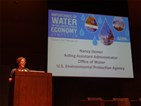Conceptual Framework Needed To Determine The Value Of Water


For a productive and growing economy, we need water. If there's no water, there's no manufacturing, energy production, agriculture, mining, fishing, and more. In fact, there aren't many sectors of the economy not dependent or influenced by water.
Water is the lifeblood of the economic development.
Simplistic observations about water's value abound. We can talk generally about water's influence. We can provide detailed and rich observations about its role in sustaining economic activity. However, it's not enough to understand water's true value or the complexity of the interrelationships between sectors that need it to operate.
What's missing, according to the the USEPA Office of Water's The Importance of Water to the US Economy Highlights Document, is a shared conceptual framework that can:
- Be applied nationally
- Demonstrate how water dependent sectors affect and interact with the rest of the economy
- Provide a more robust set of data to inform private and public decision making
- Ensure protection of this vital resource.
This report, which was delivered at the Office of Water's Importance of Water to the US Economy Symposium held yesterday at American University, summarizes the findings of its efforts to establish a baseline understanding of how water resources are used in the US and the current methods being used to analyze the economic importance and value of water. The Office is producing a report that synthesizes information from a literature review, expert papers, and a technical workshop.
A bit of background. In November 2011, the USEPA Science Advisory Board posted a Federal Register Notice requesting information on how the availability of clean water may affect economic development and offer advantages to specific sectors. Following this, a public meeting was held in early December 2011 to evaluate the issue and provide early consultative advice to the Office of Water for a project designed to improve the availability and amount of information on the value of water.
At the meeting, Dr. John Powers, EPA Office of Water, noted that his office planned to develop a report on the importance of water and had been evaluating a number of research inputs that would support the final product. According to Powers, this report would examine current data, in addition to incorporating market and non-market analyses and results from research that would be conducted to support this effort.
A follow-up letter sent from the SAB in March 2012 to Administrator Jackson confirmed what the Office of Water already knew: that there is "no organized, science-based analysis quantifying the economic contribution of water" and:
As a consequence, EPA is unable to systematically analyze the value of water to the U.S. economy, resulting in potentially inefficient resource protection and management decisions.
So what's needed? The EPA highlights report concluded that an integrated, system-based, forward looking perspective and a shared conceptual framework were vital to maximize the economic value generated by water and increase our understanding of water's exact role in economic development.
This is an issue that has broad and far-reaching consequences...for water technologies and innovation, the extraction and processing mega-sectors, high-tech manufacturing, energy production, and even the public supply of water. The water-food-energy nexus also represents a hot-bed of activity that directly influences economic activity in many other sectors. Changes in water use in this nexus affect demand and availability in a big way. We need to understand how, how much, when, and why.
The Office of Water is taking the necessary steps to make this value of water project happen and is engaging key leaders in the water sector to ensure a broad representation of stakeholder voices and expertise. It should be praised for initiating the effort and creating a product that will serve as a "catalyst for a broader discussion of water's role in the U.S. economy."
